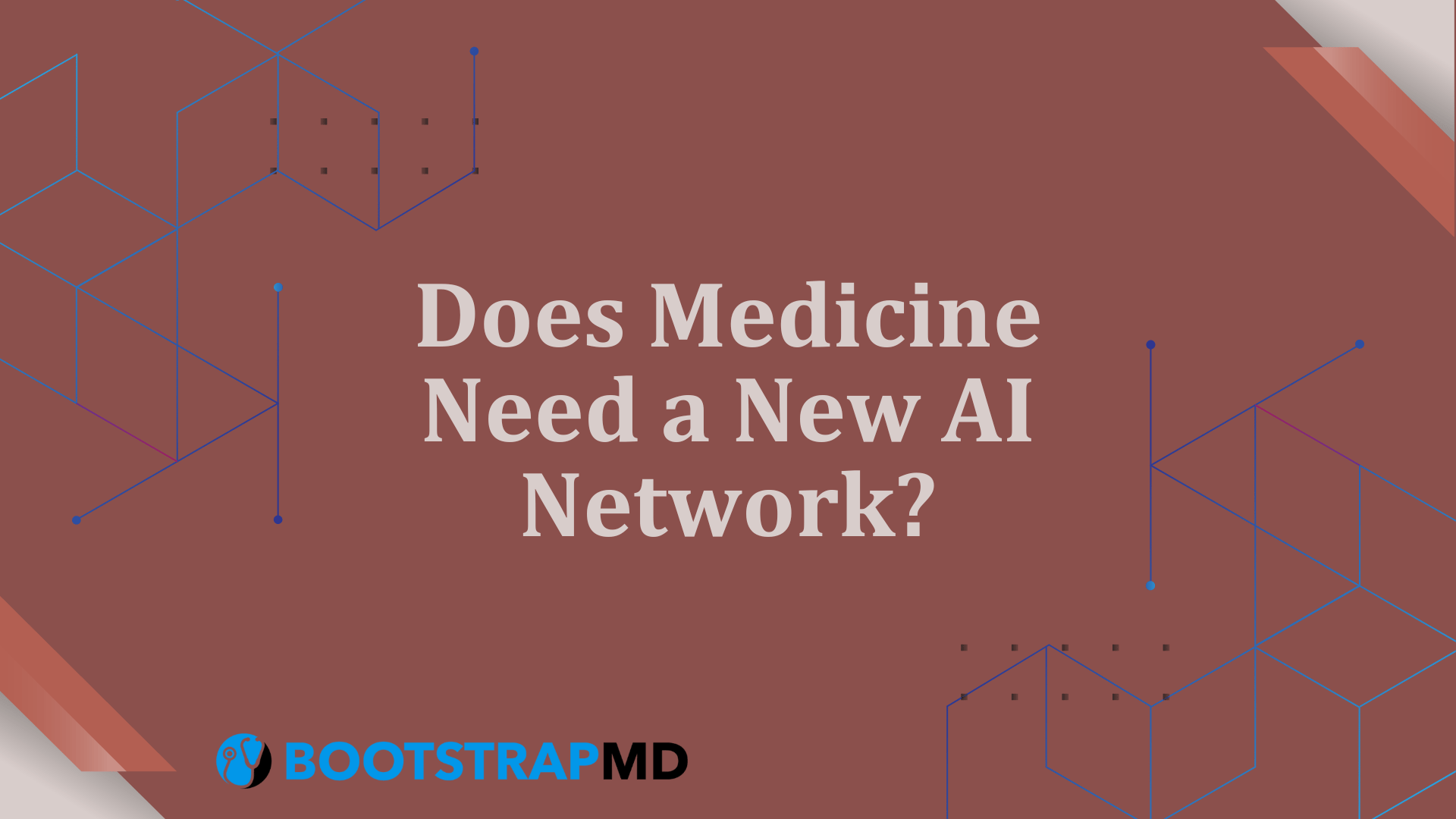- The Lounge
- Posts
- Does Medicine Need a New AI Network?
Does Medicine Need a New AI Network?
Disengaged teams drain your profits / When values talk stalls action / Forced rituals can backfire fast

The LOUNGE - A Newsletter for Savvy Physicians
We scour the net, selecting the most pertinent articles for the busy doc so you don’t have to! Here’s what kept our focus this week…
Startups are already using bots to mimic human interactions due to limited backend access.
48% of employees report their managers don’t understand how they work or their contributions.
Companies often confuse updated mission statements with real operational change.
Companies rely on rituals to build connection and drive engagement.
What if the real cure in healthcare isn’t more treatment — but more partnership?
What do space travel, firefighting, and saving lives on Earth have in common? Doctors did them all.
Stand Out as a Doctor: Unique Medical Practice Strategies
Want to differentiate your medical practice and attract high-value patients without competing on price? Discover proven strategies to set your practice apart, including: Defining a niche (e.g., targeting specific demographics), Premium, high-touch patient experiences that boost retention, Unique service packages (like a $15K men’s sexual health program), Powerful branding & storytelling to build trust, Local SEO dominance for more patient referrals, Strategic partnerships & authority-building (webinars, live events). Stop struggling with low-profit patients—learn how to position your practice as elite and command higher fees while delivering unmatched care.
Join Doctors Online Success
A free discussion forum exclusively for physicians! Connect with like-minded doctors, share insights, and gain valuable strategies for success in medicine and beyond. Don't miss out—sign up today and start the conversation!

LOUNGE TALK
Former OpenAI executive Zack Kass suggests that a “new internet” is quietly emerging—one optimized not for humans, but for AI agents. These agents don’t need user-friendly interfaces; they need structured, accessible data to complete tasks quickly and efficiently. In industries like e-commerce, this shift is already underway, but healthcare may be left in the dust. Despite advances like AI scribes and robotic surgery, healthcare IT still clings to outdated systems and tight control over data access. Most organizations aren’t prepared to give AI agents the seamless back-end access they require, often citing privacy or financial constraints. As a result, AI is finding workarounds through data scraping and UI automation—inefficient but effective. This could lead to a tipping point where bots prioritize systems that are easier to navigate, leaving laggards behind. The message is clear: healthcare must adapt or risk becoming digitally irrelevant.
Nearly half of the workers in a recent survey say their managers don’t understand how they work or what they bring to the table. The article explores how unnoticed frustration can build up, leading to low productivity, disengagement, and even employee departure—significant threats to business success. It points out that managers who fail to recognize and address frustration risk losing top talent and weakening team performance. The piece then offers concrete fixes: start with active listening, validate employee concerns, uncover root causes, and collaborate on solutions. It cautions against empty promises—being honest about what’s possible is vital to rebuilding trust. Finally, it urges leaders to make the effort visible and ongoing, rather than one-off gestures, to sustain motivation and loyalty.
Support Our Sponsor: Student Loan Planner
Concerned about medical student loans? It's time for a custom action plan. Talk with these experts who've helped over 11,000 borrowers take on $2.5 billion in student debt. Book your meeting today!
Companies frequently unveil refreshed strategies and mission statements, complete with updated decks and energizing town halls — but rarely do these efforts translate into meaningful change. The core issue isn’t poor intentions; it’s the mistaken belief that articulating strategy equals executing it. Too often, language replaces action, leaving teams wondering what’s actually different. Misalignment between stated values and daily behaviors leads to employee cynicism, customer distrust, and strategic inertia. The article outlines four critical shifts to move from branding to transformation: stop leading with language, involve people beyond the C-suite, make strategy usable, and hold leaders accountable. Ultimately, cultural change — not cosmetic updates — drives real progress. Because in the end, people don’t follow posters, they follow action.
Workplace rituals — from daily team huddles to company-wide celebrations — are everywhere, often seen as surefire tools to boost engagement and connection. Organizations invest heavily in these practices, believing they create stronger bonds and better performance. While research and business gurus often praise rituals, new findings suggest their impact isn't always positive or predictable. The key insight: rituals only work when they feel authentic, inclusive, and aligned with team culture. When forced or misaligned, rituals can feel hollow, awkward, or even demoralizing. The latest research urges leaders to think critically about the design and intent behind these practices. Because when done right, rituals can energize teams — but when done wrong, they can quietly undermine them.
In modern healthcare, outcomes improve not just with advanced treatments but with empowered partnerships between patients and physicians. Dr. Alan Feren argues that care depends on four critical pillars: agency, advocacy, responsibility, and partnership. Patients must be active participants — asking questions, understanding their options, and following through on care — while physicians must create space for dialogue, trust, and mutual respect. Drawing from personal experience, Feren illustrates how even routine care can slip through the cracks without patient vigilance and self-advocacy. He emphasizes that not all patients can navigate these complexities alone, making advocates — whether family or professionals — a vital part of the system. Ultimately, true healthcare transformation requires more than clinical expertise; it demands shared ownership of the healing journey. When agency, responsibility, advocacy, and partnership align, care becomes safer, smarter, and more humane.
Doctors are often seen as serious, smart, maybe even a little nerdy — but sometimes they’re just flat-out legendary. From orbiting the Earth to battling California wildfires, these four doctors remind us how boundary-breaking and inspiring the medical profession can be. Mae Jemison made history as the first African-American woman in space, following a career in medicine and the Peace Corps. Jonny Kim went from Navy SEAL to Harvard-trained physician to astronaut currently aboard the ISS. Gretchen Green swapped radiology for space tourism, even reaching the North Pole before launching with Blue Origin. And Chester Griffiths? He performed brain surgery and then spent five nights fighting wildfires to save his neighborhood. These doctors aren’t just healers — they’re heroes redefining what it means to wear the white coat.
WANT TO REACH THOUSANDS OF FORWARD-THINKING PHYSICIANS? CONSIDER SPONSORSHIP. CONTACT US FOR DETAILS.
QUICK BITES
These 3 common mistakes are holding you back at work.
3 ways to mitigate executive turnover.
5 questions captivating people ask to cut through the small talk.
The hidden cost of professionalism in medical training.
Like the newsletter? Share it with someone you know! If you have any feedback or suggestions for future issues, please don’t hesitate to reach out!
“The great doctors all got their education off dirt pavements and poverty – not marble floors and foundations.”

